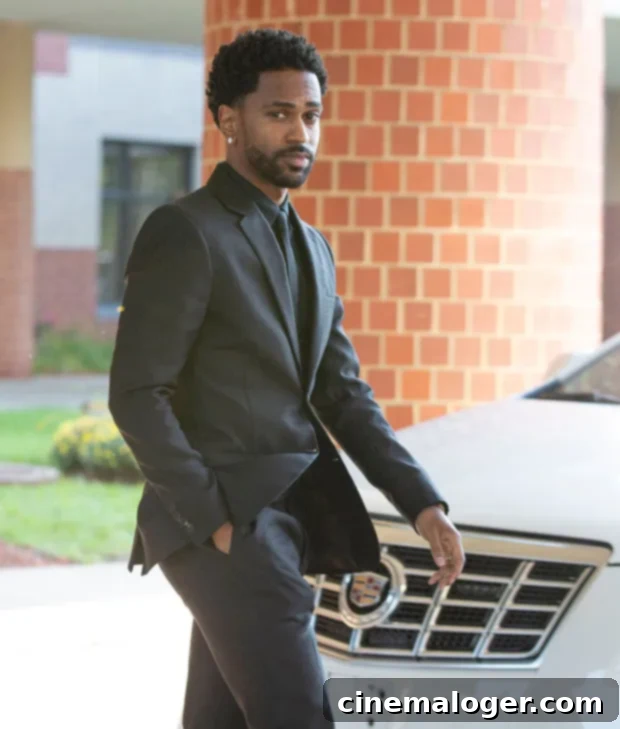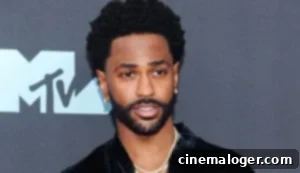Big Sean Speaks Out: A Powerful Call for Justice and Systemic Change After George Floyd’s Tragic Death
In the wake of George Floyd’s tragic death on May 25 in Minneapolis, the world erupted in protests and calls for justice. The incident served as a stark and painful reminder of the ongoing issues of police brutality and systemic racism that plague communities across the United States. As thousands took to the streets, demanding accountability and significant reform, the voices of prominent figures became increasingly crucial in amplifying these essential messages. Among those who passionately spoke out was acclaimed rapper Big Sean, 32, who used his platform to share a deeply personal and powerful message about social injustice, the African-American experience, and the imperative need for change.
On June 1, Big Sean posted a compelling video on his Instagram page, a direct and heartfelt address to his “sisters and brothers,” in which he articulated why “justice needs to be served.” His words resonated with countless individuals, offering a blend of raw emotion, historical context, and an unwavering demand for true equality. While nationwide protests were sweeping through American cities, uniting diverse communities in a common cause, Big Sean expressed a sentiment that many African Americans understand profoundly: despite the monumental efforts to demand change, he still didn’t feel “free” amidst the chaos and cries for justice. This statement underscored the deep-seated nature of the problems at hand, highlighting that freedom, for many, remains an elusive aspiration.
View this post on InstagramFrom the heart #BlackLivesMatter
A post shared by BIGSEAN (@bigsean) on
Big Sean’s Powerful Message: A Call for Justice and Understanding
In his candid video, Big Sean began by acknowledging the monumental attention the movement had garnered globally. “Clearly we got the whole world’s attention, obviously, and justice has to be served, period, and if it’s not, I don’t think things are gonna change or get better,” he stated with conviction. This direct plea for justice was not merely a wish but a declaration of necessity, implying that without tangible accountability for the wrongful death of George Floyd and countless others, the cycle of injustice would persist. He underscored the critical juncture the nation found itself in, where inaction would only perpetuate existing grievances.
The Detroit native also touched upon the complexities within the protest movement itself. While expressing his participation in demonstrations, he voiced concerns about certain individuals with “ulterior motives” who might engage in violent acts, thereby risking the mischaracterization of peaceful protesters as “wild beasts.” This distinction was vital, as media narratives often focus on isolated incidents of looting or destruction, potentially overshadowing the overwhelmingly peaceful and determined calls for systemic reform. Big Sean passionately countered this negative portrayal, asserting, “We’re not wild beasts, we’re extraordinary, talented, magical people that if you took us out of the equation, the world would be very, very bland.” This powerful affirmation served as a reminder of the invaluable contributions of Black people to global culture, innovation, and society, while simultaneously challenging dehumanizing stereotypes.
Addressing Systemic Racism: A Historical Perspective
One of the most profound aspects of Big Sean’s message was his unflinching examination of the historical roots of racial inequality in America. He courageously articulated his belief that “This current government and country is built on a racist foundation.” To support this weighty claim, he delved into a historical truth often overlooked or downplayed: the origins of policing in the United States. He explained how “some of the first police forces ever” were “made during slavery down south,” with their “main focus” being “to capture, apprehend, beat, and discipline slaves.” This historical context is critical for understanding the contemporary relationship between law enforcement and Black communities, suggesting a deeply ingrained institutional bias that continues to manifest in modern policing practices.
His reference to slave patrols highlights a foundational paradox in American ideals. In a nation that champions itself as the “land of equality and freedom,” Big Sean’s personal experience sharply contrasted this narrative. “You want to talk about land of equality and freedom, I don’t feel equal and I don’t feel free,” he stated, echoing the sentiments of millions of African Americans who feel the burden of systemic oppression despite constitutional guarantees. This poignant observation underscores the gap between aspiration and reality for many citizens. He concluded that for genuine, lasting change to occur, a fundamental overhaul is required: “things need to be updated and the government needs to ‘relay the foundation’.” This call for a re-laying of the foundation implies not just superficial policy adjustments but a deep, structural reimagining of institutions, laws, and societal norms to dismantle the enduring legacies of racism.

The Black Lives Matter Movement and Widespread Protests
Big Sean’s impactful video was released amidst a period of intense public mobilization, with thousands of protesters making headlines across the globe. For weeks, individuals from all walks of life have taken to the streets to march for George Floyd and to champion the Black Lives Matter movement. These demonstrations were characterized by their creativity, passion, and unwavering commitment to demanding change. Participants carried signs emblazoned with powerful messages, initiated uplifting and positive chants, and engaged in silent demonstrations designed to draw solemn attention to the gravity of racial injustice. The overarching goal was clear: to raise awareness, foster empathy, and ultimately compel systemic changes that would ensure accountability for police misconduct and dismantle structures of racial inequality.
While the vast majority of these protests were peaceful and purposeful, some incidents regrettably escalated into violence, including looting and confrontations between demonstrators and law enforcement. The police response in certain instances, involving the use of rubber bullets, tear gas, and pepper spray, further highlighted the tensions and deep divisions within society. However, it is crucial to recognize that these episodes represented a fraction of the broader movement. Throughout this tumultuous period, countless peaceful moments unfolded, demonstrating the resilience, unity, and unwavering spirit of those advocating for justice. Communities came together in solidarity, holding vigils, organizing discussions, and participating in civil disobedience, all aimed at fostering a more just and equitable society for African Americans and all marginalized groups.
George Floyd’s Family Joins the Fight for Justice
The poignant call for non-violence and sustained dedication to the cause was echoed by George Floyd’s own family. On June 2, just days after Big Sean’s video, Floyd’s family joined protesters in his hometown of Houston, TX. Their presence at the demonstration was a powerful statement of solidarity and a heartfelt expression of gratitude for the immense outpouring of global support. During the event, George Floyd’s brother, Philonise, delivered an emotional address to a crowd of thousands. He specifically implored protesters to maintain peace and purpose. “I don’t want nobody to be protesting violently…You’re saying it in all our names not just his name. It’s bigger than my brother,” Philonise urged. His words served as a crucial reminder that the movement, while sparked by the tragic death of George Floyd, transcends a single individual. It encompasses generations of systemic injustice, police brutality, and the ongoing struggle for civil rights, making the collective pursuit of justice paramount.
The Amplifying Power of Celebrity Voices
Big Sean’s decision to share his perspective publicly underscores the significant role celebrities play in national and global conversations about social justice. As an influential artist with a massive following, his voice carries considerable weight, reaching audiences who might not otherwise engage with these critical issues. By speaking with such raw honesty about his experiences as an African American, his feelings of unfreedom, and his critique of systemic racism, Big Sean provided a relatable entry point for many to understand the profound impact of these injustices. His message not only validated the feelings of those directly affected but also educated and galvanized others to reflect on their own roles in advocating for a more equitable society. The visibility and cultural impact of artists like Big Sean are indispensable in sustaining momentum for change, ensuring that the demands for justice for George Floyd and others continue to resonate long after the initial wave of protests subsides.
Conclusion: An Ongoing Struggle for Equality and Reform
Big Sean’s heartfelt plea for strength, justice, and systemic reform serves as a powerful testament to the ongoing struggle for racial equality in America. His words, delivered with conviction and personal insight, not only highlighted the immediate need for accountability in George Floyd’s case but also shone a spotlight on the deeper, historical foundations of racism embedded within the nation’s institutions. By daring to speak about not feeling truly “free” and advocating for a fundamental “re-laying of the foundation” of government, he challenged both the superficiality of certain reforms and the complacency that allows injustice to persist. As the Black Lives Matter movement continues to evolve, drawing attention to widespread issues of police brutality and systemic discrimination, voices like Big Sean’s remain vital. They remind us that the pursuit of justice is a collective responsibility, requiring sustained effort, unwavering advocacy, and a deep commitment to building a society where equality and freedom are not just ideals, but lived realities for all.
